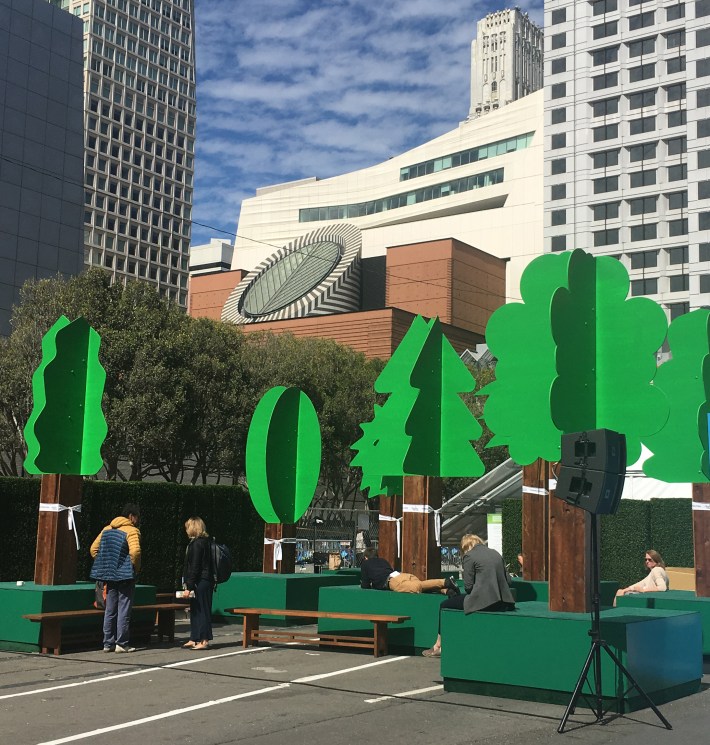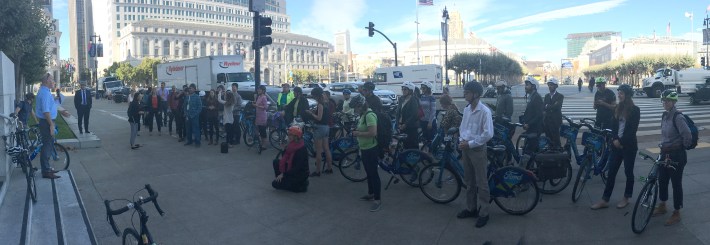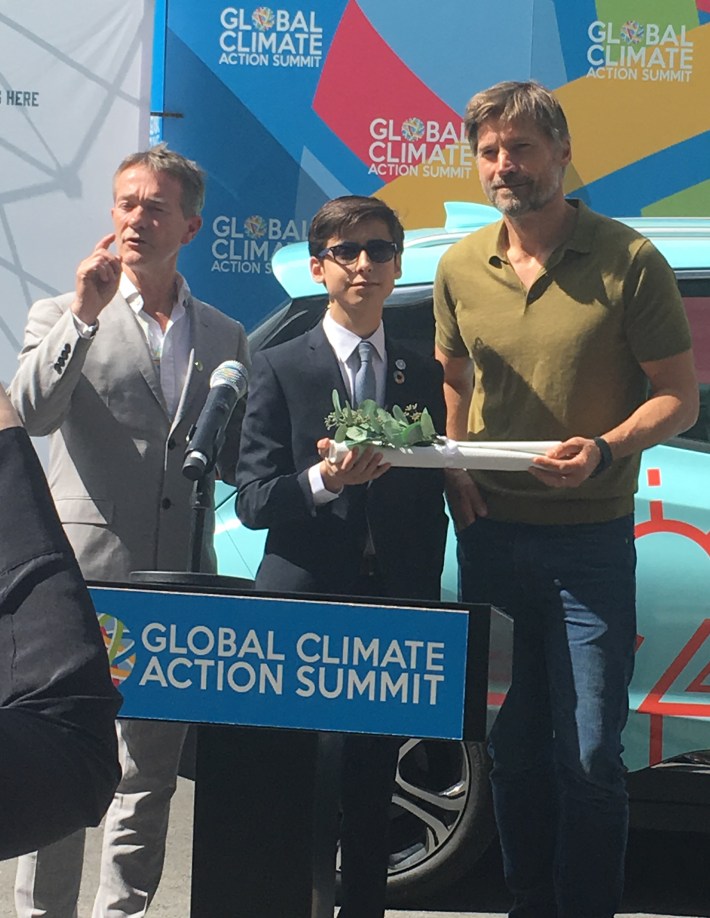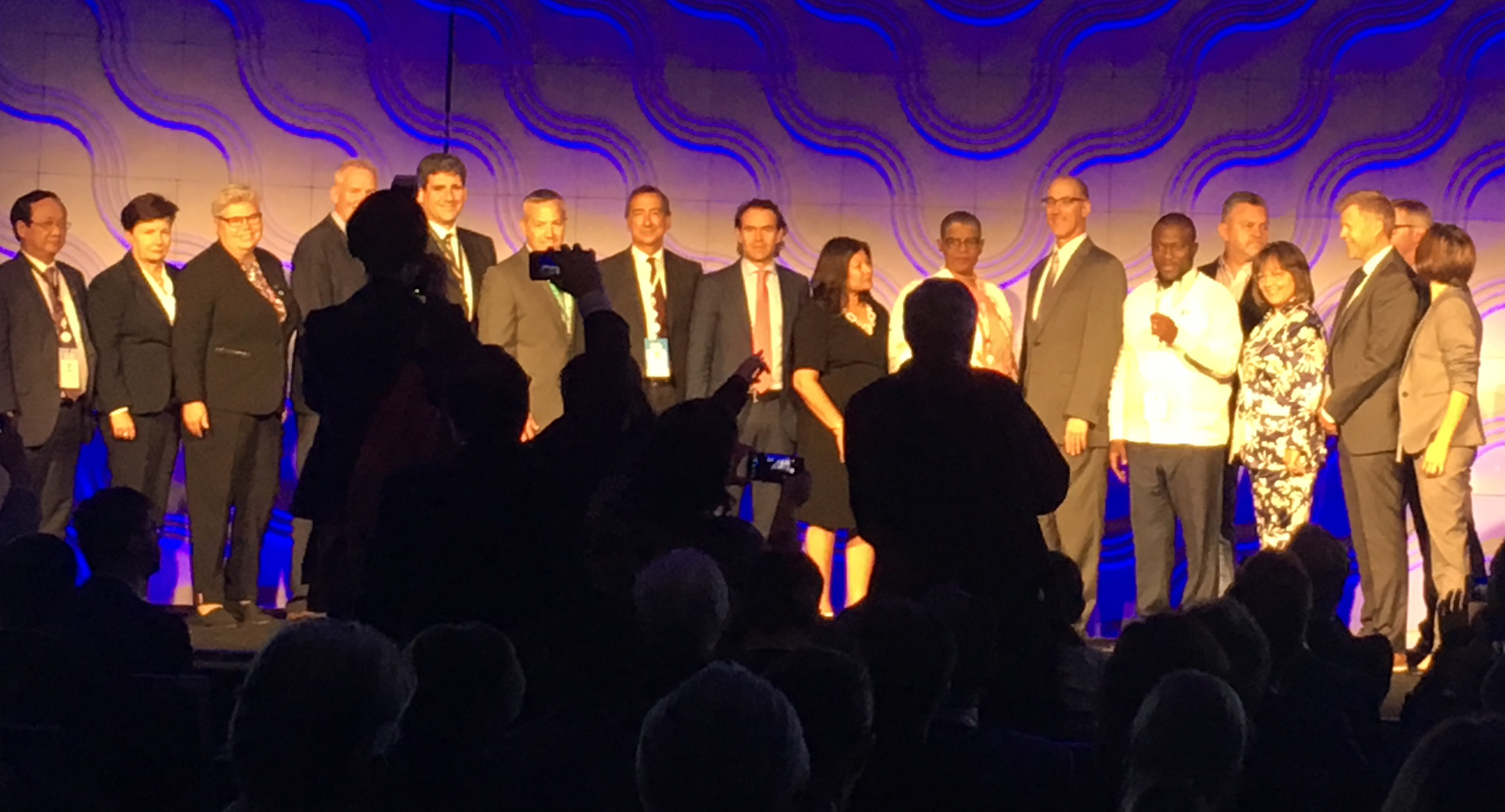Note: GJEL Accident Attorneys regularly sponsors coverage on Streetsblog San Francisco and Streetsblog California. Unless noted in the story, GJEL Accident Attorneys is not consulted for the content or editorial direction of the sponsored content.
Outside, protestors blocked the entryways with banners and bodies. Delegates at the first day of the Global Climate Action Summit had to squeeze past them, and police, to get inside. “Keep it in the ground!” said their signs, and “This is Brown's last chance.”
But inside the Moscone Center, it was mostly business. CEO after CEO stood up to declare commitments to reducing carbon use, to everything they do now but cleaner and more efficiently.
“Getting to carbon-free” was the byword of the summit. And it would happen without affecting the profitability of the companies making those commitments.
In the rush to give everyone their few minutes at the mic some of the counter messages—about climate justice, about offering incentives or opportunities for people to make deeper changes—were mostly ignored, or brushed aside.
Winnie Byanyima, Executive Director of Oxfam International, spoke of climate justice in the open plenary session. “Climate change is a political issue, not a technical issue,” she said. “It's a question of justice and fairness.”
“It would take my grandfather, who lives in Uganda, 129 years to emit the same carbon as the average American citizen,” she said. “The emissions that are damaging our planet are being produced by rich people, but the repercussions are hitting poor people the hardest.” And while poorer and less industrialized countries are making commitments to cleaner and renewable energy, that won't make up for emissions coming from industrialized countries.
But as soon as she finished speaking, it was Kevin Johnson's turn. He's the CEO of Starbucks, and he's clearly proud of the his company's environmental initiatives. Using “greener cups,” for example. “We introduced a recyclable cup,” he said, but there were other issues--“not all cities have recycling facilities.” Nevertheless, he promised, “Our aspiration is to be the number one company in the world with a sustainable platform, from farmers to stores.”
“The pursuit of profit is not in conflict with doing good,” he declared. This seemed to be the real theme throughout the event.

Commitments were made, agreements were signed, speaker after speaker made big announcements about how soon they pledged to go carbon neutral or how much money they would invest in climate solutions; business leaders touted their energy efficiency achievements, declaring that it was definitely possible to “do good while doing well”--in other words, none of them were risking their bottom line. Civic leaders patted themselves on the back for committing to zero carbon by 2030, or 2045, or 2050, depending who was talking.
But youth leaders and indigenous leaders and leaders from countries outside of the industrialized nations kept reminding people that the investments were nowhere near enough; that the world's attention was on the dangers of the planet, but concrete action is too slow in coming; that there isn't a lot of time left to get something done.
“We can't do any mitigation because we don't own the industries that are causing these problems,” said Ambassador Macharia Kamau of Kenya. “We are victims of climate change—but we also need to figure out what we can do to fight it.”
“Africa,” he said, “is going to industrialize” and unless dramatic changes happen soon, “it will be forced by circumstance to use old technologies. It will repeat the mistakes of the other industrialized nations, and then everything you are doing here might be undone,” he said.
Dr. M. Sanjayan, CEO of Conservation International, speaking on a panel that discussed threats to oceans, pointed out that the amount of money being invested now in preserving the world's oceans is trivial, “less than the marketing budget for any single Marvel movie,” he said. “We need an order of magnitude more money; we need private money, we need corporate money.”
But the industry leaders were focused on their own promises about changing from fossil fuels to electricity; the oceans, it seems, are someone else's problem.
Among the landmark agreements, commitments, and pledges to reducing carbon emissions and fund climate efforts were these:
- Mayors of 27 cities worldwide signed an international agreement committing to reduce their carbon output and work to meet the Paris agreements on global average temperature rise
- Mexico City became the first Latin American city to sign the “Green Bond” pledge to increase funding for climate friendly infrastructure. (California, New Mexico, Rhode Island, Asheville, San Francisco, King County in Washington are among governmental entities that have already signed)
- The Global Green Bond Partnership was launched to support cities, states, regions, corporations, and financial institutions to accelerate the issuance of green bonds.
- 21 companies announced an alliance, the Step Up Declaration, to invest in emerging technologies to help reduce greenhouse gas emissions across all economic sectors and “ensure a climate turning point by 2020.”
- New York Mayor Bill de Blasio announced that the city's pension fund would double its investment in climate solutions to $4 billion
- The World Green Building Council launched the Net Zero Carbon Buildings Commitment
and many more.
Los Angeles mayor Eric Garcetti was one of the civic leaders who gave a speech, saying that L.A. was the first city to sign the C40 Fossil Fuel Free Streets pledge. “Los Angeles is number one in traffic,” he said, but its transit system is growing, and city voters passed “the largest transit initiative in U.S. history” last November, he said. In addition to the C40 pledge, he said, both the L.A. and Long Beach ports have committed to becoming completely zero emission by 2025.
The pledge commits cities to buying only zero emission buses by 2025—but why not start now? It also contains a promise to create people-friendly planning, increase the rates of walking, cycling, and public transit use while reducing fossil-fuel vehicles. Unfortunately, Garcetti forgot to mention the biking and walking part, as did a depressingly large number of the speechmakers at the summit.

But other mayors signing the same agreements did not forget the importance of low-impact, low-speed, zero emission transportation. The mayor of Rotterdam, Ahmed Aboutaleb, said that his city already has over 600 kilometers of bike lanes, and has removed over 6,000 parking spaces from its downtown, making it into a “city lounge” people ride their bikes to hang out in. Mayor Hanna Gronkiewicz-Waltz of Warsaw said her city has over 500 kilometers of bike lanes and plans to invest more money to expand that number. The mayor of Medellin, Federico Gutiérrez-Zuluaga, said that since 2016 the city has added 80 km of bike lanes—doubling what it previously had—with plans to expand further. Medellin wants to “encourage every person to make choices that involve driving less,” he said. “The key is cultural change.”
The summit's focus was on the pledges of business and civic leaders to meet or exceed the goals of the Paris Accords, and nobody pretended it would be easy. Civic leaders especially addressed the complex interconnected issues of spatial planning, housing, transit, electric vehicle infrastructure, and trees. But focusing on these commitments made it harder to hear the voices of people who don't have money at their disposal. The heavy reliance on increasing electric vehicles is a good example of this: yes, it needs to happen, and yes, it will take a lot of money. Those who can afford electric vehicles should buy them A.S.A.P. and cities and counties and states should be helping by investing in charging stations and encouraging others to do so. But people also make shifts in their own lives—we must drive less, for example. Not a whole lot less (well, for some people) but everyone has to be more mindful of the environmental costs of every trip.

But there was too little of this at the summit. The focus on industry's bottom line, and whether it's possible to “do good while doing well” distracts from the urgency of actually making the changes that are necessary to stop the environmental and climate degradation we are all responsible for.
Even Jerry Brown's announcement at the end, that California will launch “its own damn satellite” to study the effects of climate change, misses the mark. We already know what changes we need to make. We already know we have to stop investing money in infrastructure—highways, parking lots, sprawl—that contribute to greenhouse gas emissions. It would have been better to hear about that than a satellite.
Dave Mathews, one of the celebrities who made an appearance at the summit—he joined animal advocate and “peace ambassador” Jane Goodall on stage--took a moment to point out the tension. “We have to bridge the gap between those who have a voice and—those kids outside, who feel voiceless and desperate,” he said. “Because they have exactly the right amount of desperation, which is: absolutely desperate.”






